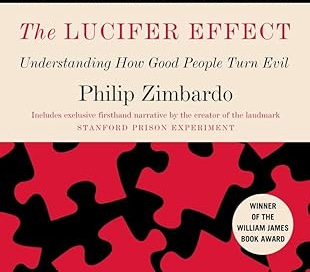Published in 2008, the concepts laid out in this book provide insight into unexplainable evil in the world.
Dr. Zimbardo is a famous name in the psychological fields, best known for his Stanford Prison Experiment. The experiment was groundbreaking because it created an environment in which seemingly normal college students exhibited abusive and unruly behavior within days of the experiment’s start. Those in the role of guards became cruel and oppressive while the prisoners became rebellious and emotionally disturbed. You can learn more about the Stanford Prison Experiment here.
Although it was ended well before the intended time, the Stanford Prison Experiment provided a lot of information about how roles and environments influence “good people.” Dr. Zimbardo continued to study why and how good people end up doing very bad things, and those observations are catalogued in The Lucifer Effect. In addition, he explains how these roles and environments played a role in the Abu Ghraib atrocities. He was an expert witness in that trial.
This is a must-read for psych nerds, counselors, social workers and anyone else interested in how systems influence people. For others, knowing some of the basic concepts might shed light on some things that are occurring in today’s society.
There were several concepts presented in the book that contribute to good people doing bad stuff.
Compartmentalization - This occurs when a person internalizes their role. In the prison experiment, a prison guard became their role both personally and professionally. “Prison guard” became their identity. Then, everything they did was in service to that role/identity rather than considering their charges as people.
Dehumanization and deindividuation - Groups of people or people in general are viewed as their labels and not as individual human beings. This makes it easier to commit acts of violence because it is not a mother or a brother being hurt, but a (insert label here). This is the tool used in any kind of genocide or hate-based group. (Insert label here) are evil, which means anyone who identifies with that label is evil and nothing else about them matters. This label=evil calculation also means those labels deserve anything coming to them. It also works in reverse for the people committing evil acts. When people feel anonymous, they are more likely to commit violence or be cruel. Think of the anonymity of the internet and how cruel people can be. Would they be that cruel to someone in person? Think of the riots that get violent. How many people in those riots are wearing masks? According to Dr. Zimbardo, the more anonymous people feel, the more they are willing to commit violence.
Obedience to authority - Rules have the power to shape reality and may take up a life of their own. Then, add in the necessity to obey someone in authority to keep one’s position. The more value one puts on authority figures, the more susceptible they are to instructions from authority. We see this in the current cancel culture.
Peer pressure - When everyone else is doing something, it becomes more difficult to go against the crown. Asch’s conformity experiments demonstrated this power. Those experiments found that a majority of people will go along with the crowd even when they know the crowd is wrong.
Pressure to conform - Social pressure is powerful. Most people seek social approval, which is why cancel culture works.
In considering the impact of this book, it’s important to note that this does not explain everything or everyone. Not everyone conforms. Not everyone buys into peer pressure. Many people still consider the human and not just the label or identity. Not everyone believes that authority is always right. Therefore, take this information for what it is. A possible and plausible explanation for some situations and some people.
One point that struck me in this book is that personality testing did not predict how individuals were going to react to the environment in the Stanford Prison Experiment. All of the young men chosen were high achievers, had never been in trouble before, and had good family and social backgrounds. Then, they get into this environment and turn into very different people. And it happened very, very fast. This suggests that you never know who will engage in evil behavior.
Another thing that struck me about the book and the research is that none of it discussed the role of a Christian worldview. Or any kind of religious worldview. As a Christian, my authority is God. As a Christian, I strive to treat people as my brothers and sisters in Christ. I see others as made in the image of God. When I make choices, I make them based on whether my actions demonstrate my belief in God. And my identity is in Christ. The other labels I carry are meaningless compared to that one. I would be very curious whether someone with a solid foundation in Christian ethics and behavior would succumb to the environmental pressures presented in the book.
Either way, my takeaway was increased awareness about the factors that contribute to good people going bad. Resist becoming consumed by a role. Consider the human being as a human being, not as a (insert label here) because people are so much more than that. Authorities are not always right. Be prepared to stand up for truth and have a backup plan in case things go wrong. Don’t be so tied to something that you cannot stand up for your values. Don’t go along with people just because and resist the urge to conform for social approval. Peer and social approval is fickle.
Not everyone needs to read the book. The links in this review will take you to shorter summaries of the book as well as videos where Dr. Zimbardo talks about the findings he presents there. If you end up watching some of these, I’d love your comments and thoughts on it.



